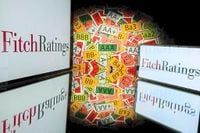France is once again at the center of Europe’s political and financial storm, as a historic credit downgrade by Fitch Ratings and deepening political fragmentation send ripples across Paris, Brussels, and beyond. On the evening of September 12, 2025, Fitch slashed France’s sovereign credit rating to A+ from AA-, the lowest ever recorded for the eurozone’s second-largest economy, citing persistent political instability and a ballooning public debt. The move, which many market analysts had anticipated, nevertheless struck a nerve in the French capital and across the continent, compounding worries about France’s fiscal trajectory and its waning influence in European affairs, according to reporting from AFP and Reuters.
The timing could hardly be worse for newly appointed Prime Minister Sebastien Lecornu. Just days into his tenure—he is President Emmanuel Macron’s fifth prime minister in under two years—Lecornu must now draft a 2026 budget that can pass a bitterly divided parliament. The deadline to deliver the budget’s first draft is October 7, with a possible extension to October 13, but political consensus seems more elusive than ever.
France’s fiscal woes are stark. The country’s budget deficit now stands at 5.4 percent of gross domestic product, the largest in the eurozone. Fitch’s downgrade specifically pointed to the lack of “a clear horizon for debt stabilisation in subsequent years,” underscoring the challenge Lecornu faces in convincing both investors and lawmakers that France can rein in its spending. Finance Minister Eric Lombard acknowledged the gravity of the situation, stating that the government is “pushing ahead with consultations with lawmakers to get a budget adopted and restore the public finances,” as reported by Reuters.
Lecornu’s task is complicated by a restive political landscape. The French parliament is fractured into three major blocs, each with its own vision for fiscal reform. The Socialists, for their part, have demanded a new wealth tax on the ultra-rich as the price for not toppling Lecornu’s government. On September 13, Lecornu signaled openness to the idea, saying he was willing to discuss higher taxes on the wealthy and announcing the scrapping of his predecessor’s unpopular plan to eliminate two public holidays. But these overtures have only inflamed tensions elsewhere.
France’s powerful employers’ federation, MEDEF, led by Patrick Martin, has vowed to “mobilize in mass” against any move to tax the wealthy, warning that such a step could damage already fragile economic confidence. Conservative Republicans, too, are wary. Outgoing Interior Minister Bruno Retailleau cautioned that the Socialists’ demands would “only make matters worse” in a country already notorious for high taxation.
Meanwhile, labor unions are preparing for battle. Nationwide strikes are planned for September 18, with workers protesting Lecornu’s proposed spending cuts. The street-level unrest adds another layer of complexity to the government’s efforts, as Lecornu tries to balance fiscal discipline with social stability. “The future budget may not fully reflect my convictions ... In fact, that’s almost certain!” Lecornu admitted in his first interviews since taking office, calling for “frank” discussions with the Socialists, Greens, and Communists.
Financial markets, for now, have taken the downgrade in stride. The risk premium France pays over German debt has remained steady at just under 80 basis points, French stocks have risen, and the euro has shown little reaction. But the threat of further downgrades looms large. Mohit Kumar, an economist at Jefferies, warned that upcoming reviews by Moody’s on October 24 and S&P on November 28 could bring fresh pain if political uncertainty persists. “If political uncertainty lingers, there is a risk of at least one more downgrade,” Kumar said, noting that a second downgrade could trigger forced selling of French debt by investors bound by ratings thresholds.
The political crisis has spilled far beyond France’s borders, undermining its standing in the European Union. According to Le Figaro, the centrist Renew Europe group, which once played a pivotal role in the European Parliament, is now struggling to find its footing. The group lost nearly a quarter of its members in the June 2024 European elections, falling to fifth place with just 77 MEPs. The French delegation, once a dominant force, has been reduced to 13 loyalists, with many key figures sidelined.
This erosion of influence has had real consequences for France’s ability to shape European policy. When the European Commission launched the ratification process for the long-awaited Mercosur trade agreement on September 3, Renew Europe initially supported the move. Yet, within hours, French members of the group—caught between their own government’s shifting stance and internal divisions—pushed for its suspension. The episode highlighted the Macronists’ declining sway in Brussels and Strasbourg, as well as the broader fragmentation of the European center.
Dirk Gotink, a Dutch MEP from the European People’s Party, summed up the mood among France’s European partners: “Emmanuel Macron’s promise was to strengthen Europe. His legacy will be its weakness: you cannot build a strong Europe with weak countries.” The grand rhetoric of European sovereignty and strategic autonomy that once defined Macron’s approach now rings hollow in the face of France’s dependence on financial markets and its inability to deliver fiscal reforms.
Renew Europe’s diminished role has left it sidelined in key votes on immigration and climate legislation. Manfred Weber, the influential leader of the EPP, has repeatedly bypassed the centrists, preferring to forge alliances with other parties. Valérie Ayrault, chair of Renew Europe, made a heartfelt appeal to Commission President Ursula von der Leyen during the State of the Union address in early September, urging her to help preserve the European Parliament’s majority. “We need you because for weeks, months, I have been struggling to hold the two flanks of your majority together so that it can be preserved and we can move forward,” Ayrault pleaded in the Strasbourg chamber.
Yet the reality is that France’s voice is increasingly muted on the European stage. The country has struggled to assert itself in trade negotiations, from the Mercosur deal to recent trade tensions with the United States. Macron found himself isolated in efforts to balance relations with the American administration, while von der Leyen and other European leaders prioritized cohesion over confrontation.
The sense of malaise is palpable. Some European officials have even begun to compare France—once the continent’s engine of integration—to the “sick man of Europe.” Dirk Gotink voiced a common concern: “The fact that Italy has become more stable than France is worrying.” While countries like Italy, Greece, Portugal, and Spain have made strides in restoring order to their finances, France’s collective lack of political will is eroding confidence in Brussels and other capitals.
As Lecornu scrambles to assemble a budget that can satisfy investors, unions, and a fractious parliament, the stakes could hardly be higher. Marine Le Pen and Jordan Bardella of the far-right National Rally are pressing Macron to call new parliamentary elections—a demand he has so far resisted. But with France’s credit rating at a record low, its political center in disarray, and its European partners losing faith, the road ahead looks perilous. The next few months will be a test not only of Lecornu’s political acumen but of France’s ability to reclaim its voice at home and abroad.




